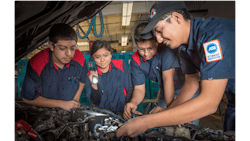ASE's Adopt-A-School Program connects educators and CV industry
Although it might sound like a purely altruistic venture to adopt a school, the ASE Education Foundation’s new Adopt-A-School program is a great opportunity for businesses and organizations to give back and receive business benefits as well.
“The ASE Education Foundation’s Adopt-A-School program not only offers companies a way to show support for their local high school and college training programs, but it also benefits their businesses by connecting them with the next generation of service professionals,” said Mike Coley, president, ASE Education Foundation. “The companies that have already adopted schools are seeing the advantages of these efforts. The ASE Adopt-A-School program not only allows these organizations to be good citizens, but also provides them with an avenue to access future employees. It’s a terrific opportunity all the way around.”
The goal of the Adopt-A-School program is to create partnerships between employers and schools in their respective communities and help train and prepare the next generation of commercial vehicle service professionals to enter the workforce. Businesses and industry organizations have the opportunity to mentor and hire future employees via the program.
For their part, schools get industry partners who provide advice and guidance, demonstrate career opportunities for their students, and provide students with hands-on experience that will grow their skills and encourage them to pursue a fulfilling automotive career.
See also: Collaborating with schools key to solving diesel technician shortage
The impact of business-to-education coordination is significant for the vehicle service industry. Institutions such as WyoTech actively engage with businesses, and the results have been speaking for themselves, as pre-graduate students have been offered positions in the industry.
Along with teaching students the skills to make them hirable, such as diagnosing and fixing engines, WyoTech injects networking and career-focused events into the curriculum. WyoTech puts on job fairs each quarter to allow companies from various industries across the country to woo potential entry-level technicians to fill their individual skills gaps.
“Collaboration between diesel tech schools, such as WyoTech, are vital to not only the industry, but also the current supply chain issues that are plaguing the nation,” said WyoTech President Jim Mathis. “The technical school industry, as well as the ATRI, knows the importance of the education and training we provide students and what it means for the industry as a whole. The more schools that can collaborate with employers and motor carriers, the better long-term outlook the industry has.”
George Arrants, vice president of the ASE Education Foundation, spoke with Fleet Maintenance, explaining the nuance of education and the qualifications of graduated students entering the repair industry.
“I’ve been asking for a while, ‘Do we have a shortage—or do we have a shortage of qualified applicants?’ When you talk to most employers, they say, ‘Well, no, we’ve got applicants; they’re just not qualified.’
That means we don’t have a lack of interest in our industry; we have a lack of qualified applicants. And just in our accredited schools, we impacted over 115,000 students [in 2020] in transportation programs. And accredited schools maybe make up 45 or 50% of the total programs in this country. So, if you figure during COVID we’re impacting 115,000, you’ve got to figure the other 50% is probably fairly close to that. That’s a large number of people. And if we have that many people interested, we just have got to get involved.”
To get involved, and to learn more, visit the Adopt-A-School section of the ASE Education Foundation website.
About the Author
Tyler Fussner
Associate Editor | Fleet Maintenance
Tyler Fussner is Managing Editor - Community Manager at Supply Chain Connect, part of the Design & Engineering Group at Endeavor Business Media.
Previously, Fussner served as the Associate Editor for Fleet Maintenance magazine. As part of Endeavor's Commercial Vehicle Group, his work has been published in FleetOwner magazine, as well as Bulk Transporter, Refrigerated Transporter, and Trailer-Body Builders.
Fussner's May 2022 print feature 'The dawn of hydrogen trucks' was named the best single technology article in B2B by the judges of the 2022 Folio: Eddie and Ozzie Awards. Fussner was also awarded Silver in the Technical Article category for the Trade Association Business Publications International (TABPI) 2021 Tabbie Awards.
Fussner previously served as Assistant Editor for Endeavor's Transportation Group on the PTEN, Professional Distributor, and VehicleServicePros.com brands.
Fussner studied professional writing and publishing at the University of Wisconsin-Whitewater. He has experience in shop operations, is a Michelin Certified Tire Technician, and a Michelin Certified Tire Salesperson.

